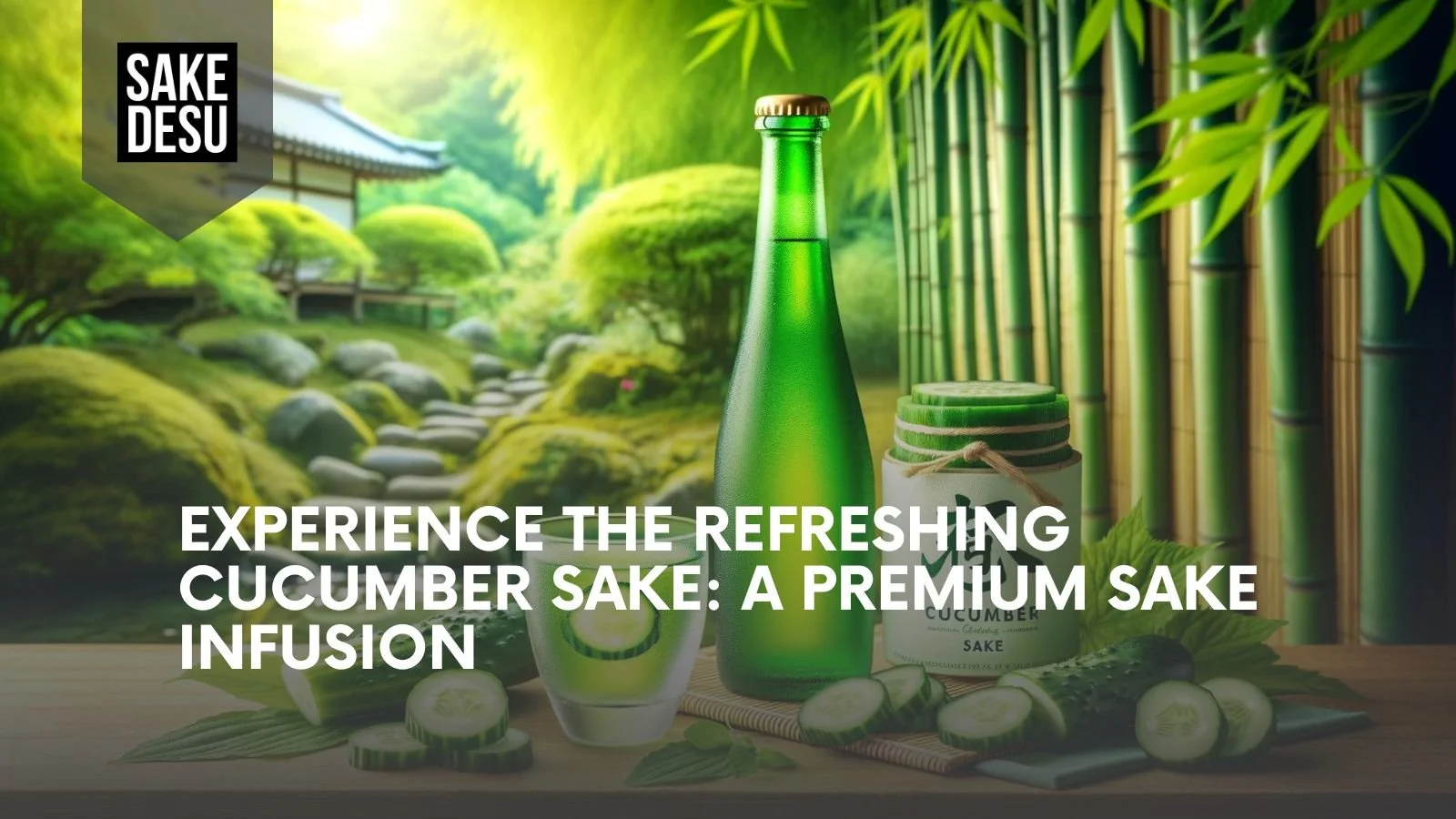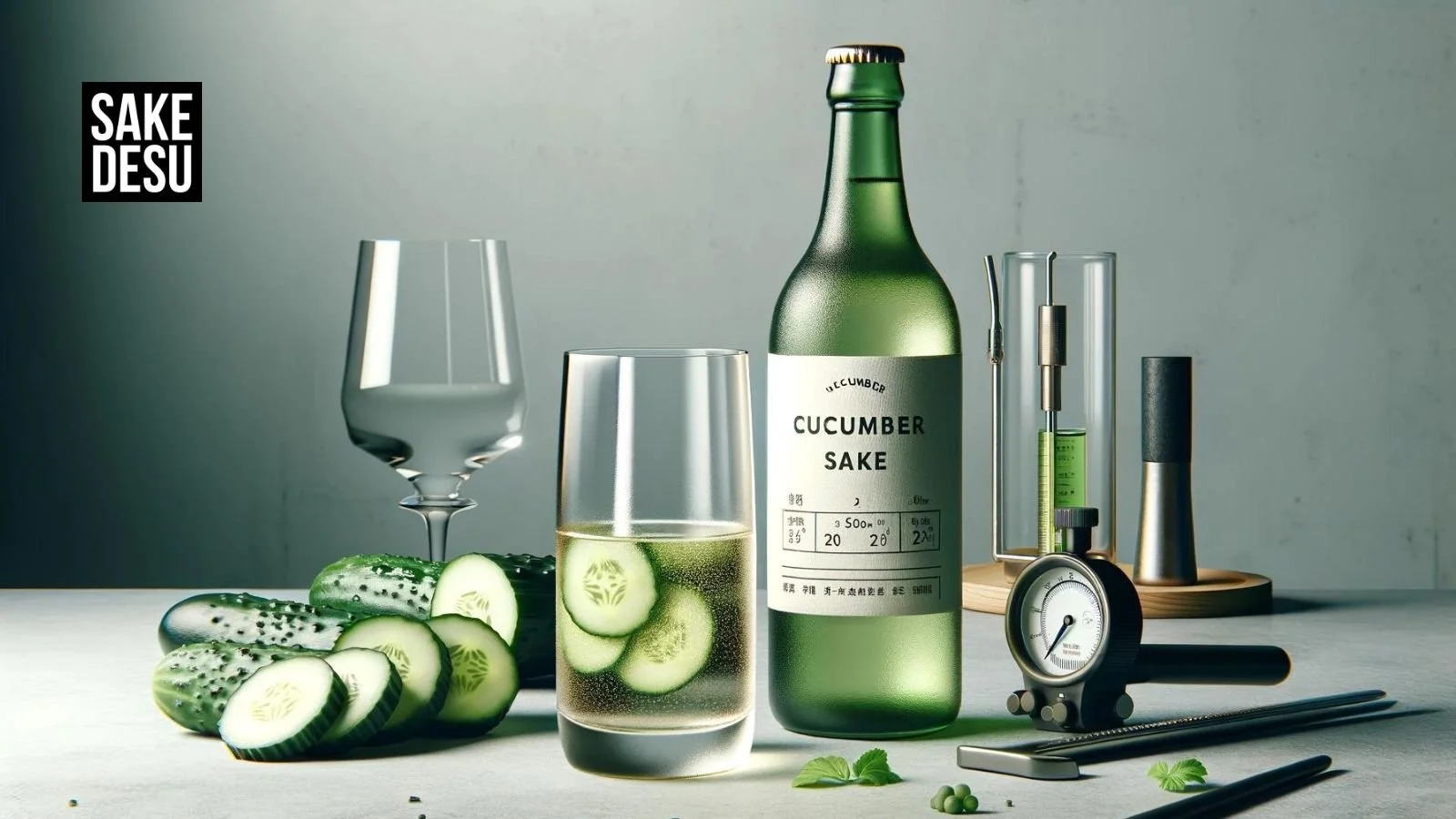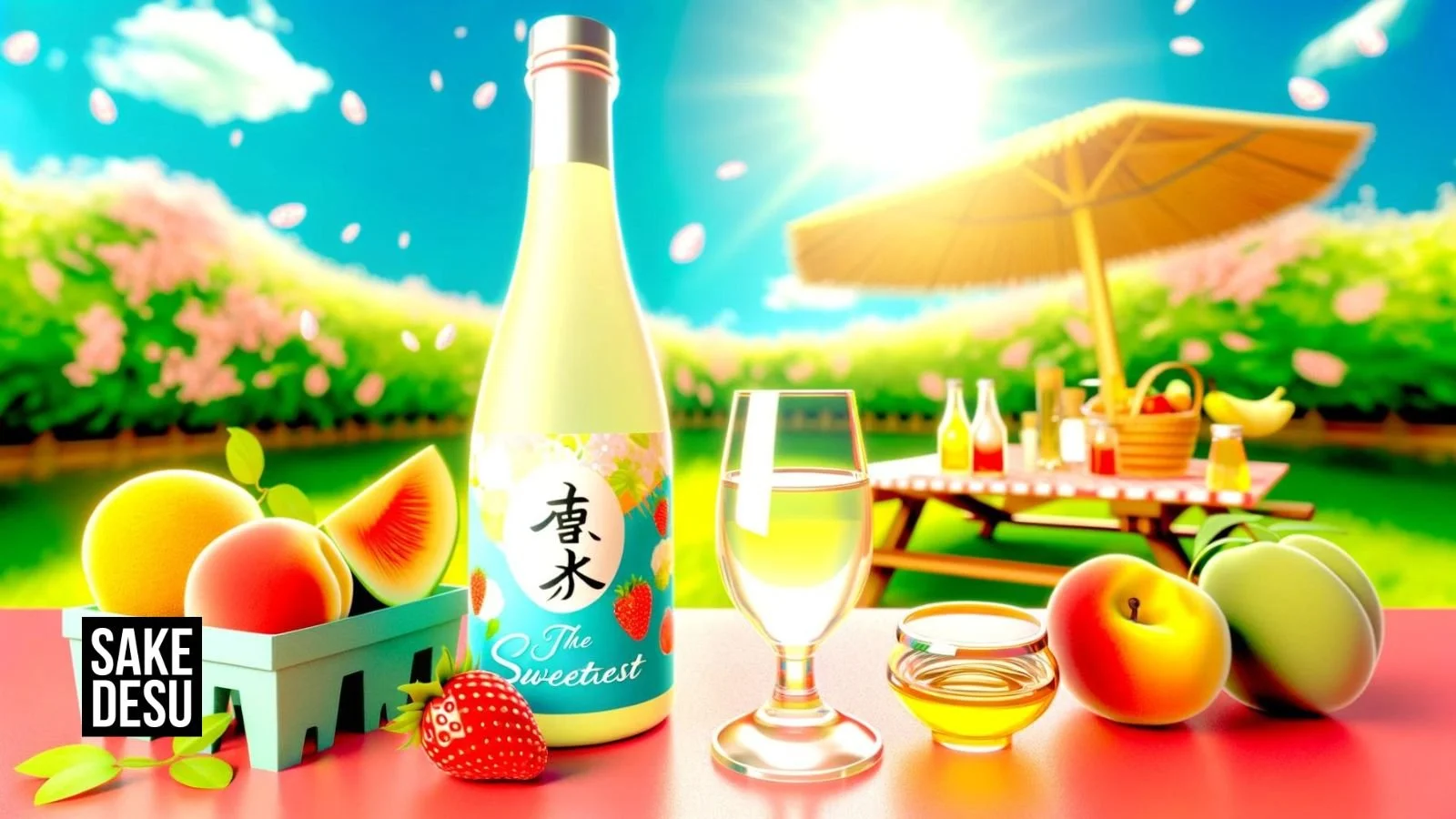Getting to Know the Cool World of Cucumber Sake
To make cucumber sake, the rich, umami flavor of Junmai sake is mixed with the crisp, cool taste of cucumber. This is a modern take on a traditional Japanese drink.
People are liking this new drink more and more because it's smooth and light, so it can be drunk casually or with more formal foods.
This article goes over everything you need to know about cucumber sake, from where it comes from and how it's made to what it tastes like and how to serve it. This article tells you everything you need to know to enjoy this unique and tasty drink.
How Much Alcohol Is in Cucumber Sake?
Alcohol by volume (ABV) levels in cucumber sake, including popular brands like Tyku Cucumber Sake, are usually between 12 and 15%.
This puts it in the same range as regular Junmai sake and a lot of wines, so it's not too strong of an alcoholic drink. Adding fresh cucumber to sake gives it a refreshing taste and makes it easy to drink, which is good for both experienced and new sake drinkers.
Typical Alcohol Content:
Most cucumber sake has between 12 and 15% ABV of alcohol.
This is where Tyku Cucumber Sake fits in, with a well-balanced alcohol profile.
Factors Influencing Alcohol Content:
The final alcohol level depends on how the sake was brewed, like with Tyku Junmai Ginjo Sake.
Adding fresh cucumber during the infusion process may have a small effect on the overall composition, but it won't have a big effect on the ABV.
The alcohol content in cucumber sake is meant to be just right to give you a pleasant, slightly drunken feeling without being too much. This makes it a great choice for people who want to enjoy a premium sake infusion either chilled or in a variety of tasty cocktails.
How to Drink Tyku Sake?
Tyku Sake, especially Tyku Cucumber Sake, is a versatile drink that can be enjoyed at many different times. Knowing how to serve and pair this one-of-a-kind sake correctly can make it taste even better and make it more enjoyable overall.
Serving Suggestions:
Ideal Temperature:
To get the most out of Tyku Cucumber Sake's crisp and refreshing flavor, serve it cold.
Another type, Tyku Coconut Nigori Sake, is also often served cold.
Glassware:
You can serve Tyku Cucumber Junmai Sake in traditional sake cups or small wine glasses.
The smell and presentation can be improved by using the right glasses.
Pairing with Food:
Tyku Cucumber Sake Pairs Well With:
Small starters like salads, sushi, and sashimi.
Seafood dishes, like shrimp and fish on the grill.
Foods that are vegetarian, like cucumber rolls and tofu dishes.
Creating A Delicious Cocktail :
You can use and create Tyku Cucumber Sake to make tasty and refreshing drinks like a cucumber sake-tini or sake spritzers.
Mixing sake with other things, like vodka or fresh lime juice, can bring out its unique flavor.
If you follow these tips, you'll get the most out of the premium sake infusion and all the different ways it can be used. This is why both experienced and new sake drinkers love it.
What Is the Sweetest Sake?
A sake's sweetness is based on its Sake Meter Value (SMV), which checks the balance between sugar and alcohol. There are different kinds of sake that are known for being sweet, while Tyku Cucumber Sake has a balanced and refreshing taste.
Characteristics of Sweet Sake:
Sake Meter Value (SMV):
Most of the time, sakes with a negative SMV taste better.
The sweetness of Tyku Junmai Ginjo Sake and other high-end junmai sakes can be different.
Factors Affecting Sweetness:
How the beer is made, including how much koji mold is used and how long the fermentation lasts.
Different kinds of sake rices, like Akebono sake rice, can also change how sweet something is.
Popular Sweet Sake Brands
Some brands are known for being sweet, and they usually have more sugar in them.
Tyku Cucumber Sake is known for having a balanced flavor, but it doesn't have to be very sweet.
If you like sweeter drinks, trying out different brands and types of ginjo sake and junmai sake can be fun. People often drink sweet sake as a dessert drink or with light dishes that go well with it. There are also high-quality, sweet sakes that have been recognized for their unique tastes that can be found by entering the most prestigious sake competition.
Is Tyku Sake Dry
If you choose the right type of Tyku Sake, like Tyku Cucumber Sake, the flavors will be well-balanced and can range from slightly sweet to dry. To figure out how dry sake is, you need to look at the Sake Meter Value (SMV), which shows how sweet and dry the sake is in balance.
Dryness Scale in Sake
Sake Meter Value (SMV):
A sake with an SMV value close to zero is balanced. A sake with a negative value is sweet, and a sake with a positive value is dry.
Tyku Junmai Ginjo Sake usually has a slightly sweet to balanced SMV, which means that a lot of people can enjoy it.
Taste Profile
Characteristics of Tyku Sake:
Tyku Cucumber Sake has a smooth finish and a light hint of fresh cucumber, which makes you feel cool and refreshed.
The sake has a silky feel and light pear notes that add to its sophisticated understatedness.
People often drink Tyku Cucumber Sake cold, which makes its crisp and clean flavor stand out even more.
Subtle Pear and Vanilla Notes
The vanilla notes make it taste creamy, and the pear notes give it a familiar smell and a light fruitiness.
These parts work together to make a good balance, like a good white wine.
Tyku Sake has a lot of different flavors, so it can be enjoyed by people who like drinks that are a little sweet or a little dry.
Can Sake Get You Drunk?
Any alcoholic drink, including sake, can get you drunk if you drink too much of it. The important thing is to know how much alcohol it has and how it makes you feel.
Alcohol Effects of Sake:
Alcohol Content:
Sake usually has between 12 and 20 percent alcohol by volume, which is about the same as fine wine.
This is the range for Tyku Cucumber Sake, which has a smooth finish and a cool taste.
Factors Influencing Intoxication:
Consumption Rate:
If you sip sake quickly, you might get drunk faster than if you sip it slowly.
Because Tyku Cucumber Sake is light and makes you feel good, it can be easy to drink too quickly, so moderation is important.
Body Weight and Tolerance:
How quickly someone feels the effects of alcohol depends a lot on their body weight and how much alcohol they can handle.
If you've never tried sake before, start with a small amount to see how much you can handle.
Responsible Drinking Tips:
Moderation:
It's important to drink sake in moderation. Food goes well with Tyku Sake because it can help the alcohol stay in your body longer.
It is common for Japanese people to drink sake with meals and with friends, which encourages responsible drinking.
By knowing these things, a sake drinker can enjoy Tyku Cucumber Sake and other types in a smart way, savoring the sophisticated subtlety and smooth finish without going overboard.
Is Sake 100% Alcohol?
Sake is a fermented drink made from rice, water, koji mold, and yeast. It is not 100% alcohol. The amount of alcohol in sake is usually between 12 and 20% ABV.
Composition of Sake:
Ingredients:
Water, rice (like Akebono sake rice), koji mold, and yeast are the main things that go into it.
The sugars in the rice are turned into alcohol during fermentation.
Clarifying Misconceptions:
Alcohol Percentage:
Even though sake is a strong drink, it has about the same amount of alcohol as a good white wine and more than most beers.
Balanced Composition:
Even though sake is a strong drink, it has about the same amount of alcohol as a good white wine and more than most beers.
Comparing Alcohol Content:
Impact of Infusion:
For example, Tyku Cucumber Sake uses infusions to give it a refreshing taste without changing the alcohol content too much.
Enjoying Sake:
When you drink premium sake infusions like Tyku Cucumber Sake, it's best to drink it cold to bring out extra flavors.
Once you know that sake isn't just alcohol, you can better understand how difficult it is to make
with a wide range of flavors. So, sake is a drink that can be used for many different situations and tastes.
Key Points:
Sake Ingredients and Alcohol Content:
Sugar, yeast, sake rice, and water are used to make it.
Most alcohol has an alcohol content of 12 to 20 percent ABV.
Infusion and Flavor:
Tyku Cucumber Sake is a premium sake that has been mixed with fresh cucumber to make it taste cool.
Infusions make drinks taste better without changing the amount of alcohol in them significantly.
By understanding how sake is made and how much alcohol it has, drinkers can better enjoy the complex flavors and refined subtlety of drinks like Tyku Junmai Ginjo Sake.
Key Takeaways
Traditional Japanese sake is changed in a fun and refreshing way by cucumber sake, especially Tyku Cucumber Sake. This drink is great for both new and experienced sake drinkers because it has the smooth, silky texture of premium Junmai sake and the refreshing feeling of fresh cucumber.
Versatile Flavor Profile: A well-balanced taste with light vanilla and pear notes. Like a fine white wine, it has a smooth finish and a sophisticated subtlety.
Serving and Pairing: It tastes best when it's cold to bring out the crisp, refreshing flavor. goes well with raw vegetables, seafood, and light appetizers.
Alcohol Content: 12 to 15% ABV, which is about the same as other fine wines. The experience is pleasant and a little enticing.
Tyku Cucumber Sake, made by world-famous Toji at the famous Umenoyado Brewery, wins awards at a prestigious sake competition for its unique taste and high quality. This sake is a pleasure to drink whether you drink it by itself or together with other tasty drinks.
Frequently asked Cucumber sake questions
-
Caffeine-free cucumber sake may have antioxidant properties and keep you hydrated. Drinking it in moderation could be healthy.
-
For the freshest taste, keep cucumber sake in a cool, dark place after opening and keep it there.
-
Cucumber sake can give marinades, sauces, and even desserts a unique flavor. Its subtle cucumber notes will make your food taste better.
-
It's best to drink cucumber sake cold, either by itself or in a cool summer cocktail. It's great for hot days and outdoor parties.
-
To get the same refreshing taste without the alcohol, cucumber-infused water or mocktails can be used.





